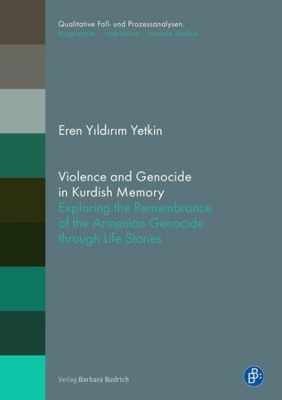Qualitative Fall- und Prozessanalysen. Biographie - Interaktion - soziale Welten
1 total work
Kurdish memories of the Armenian Genocide challenge the systematic denialism established by the Turkish state structures and foster new possibilities of coming to terms with the past. This book examines Kurdish biographies, especially from Van, Turkey, and explores the dynamics of intertwined remembrance regimes concerning the political violence on Armenians and Syriac Christians of Ottoman imperial subjects and on Kurdish citizens of Turkey. These life stories shed light on the complexity of remembering, including collective and individual memory notions on violence, perpetratorship and victimhood from past and present.
The author focuses on the Kurdish collective and individual memories through reconstructing biographical narrative interviews and ethnographic data. Based on such empirical inquiry, Yetkin argues that the genocide memory helps the Kurdish society articulate, describe, and discuss its own experiences with the state and political violence.
Thus, denialism as a systematic notion by the Turkish state apparatus appears to be read accurately when the ongoing state violence on Kurds is problematised parallelly. Alternative younger voices questioning the forefathers’ involvement in the persecution have repeatedly confronted Kurdish positions in politics and civil society fostering critical discussions on the past – underscoring reconciliation with Armenians yet employing anachronistic patterns of storytelling. They have opened up new trajectories based on their experiences.
Hence, the author understands the situation as a multi-faceted and multi-layered memory complexity that contains interwoven narratives starting the Kurdish social time with the genocidal violence on Armenians and Syriac Christians of the region and pointing out continuous oppression. In short, a sphere of contested and multidirectional memories challenging foundations of denialism and settled stories emerges within this context and makes the Kurdish experiences discussable.
The author focuses on the Kurdish collective and individual memories through reconstructing biographical narrative interviews and ethnographic data. Based on such empirical inquiry, Yetkin argues that the genocide memory helps the Kurdish society articulate, describe, and discuss its own experiences with the state and political violence.
Thus, denialism as a systematic notion by the Turkish state apparatus appears to be read accurately when the ongoing state violence on Kurds is problematised parallelly. Alternative younger voices questioning the forefathers’ involvement in the persecution have repeatedly confronted Kurdish positions in politics and civil society fostering critical discussions on the past – underscoring reconciliation with Armenians yet employing anachronistic patterns of storytelling. They have opened up new trajectories based on their experiences.
Hence, the author understands the situation as a multi-faceted and multi-layered memory complexity that contains interwoven narratives starting the Kurdish social time with the genocidal violence on Armenians and Syriac Christians of the region and pointing out continuous oppression. In short, a sphere of contested and multidirectional memories challenging foundations of denialism and settled stories emerges within this context and makes the Kurdish experiences discussable.
